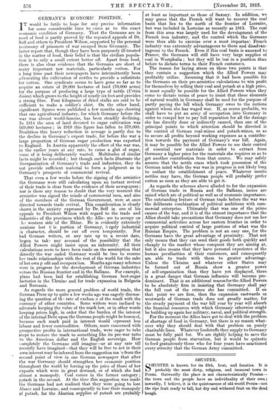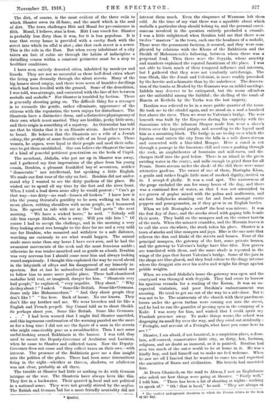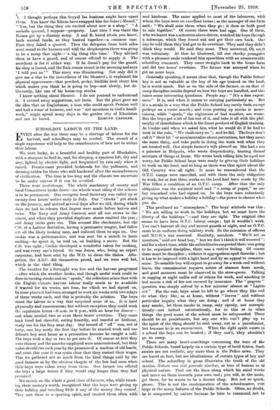SHUSTER.
SHUSTER is known for its filth, heat, and fanatics. It is probably the most dirty, religious, and immoral town in Persia. Outwardly the place is not characteristically Persian— the town and the people have an individuality of their own ; inwardly, I believe, it is the quintessence of old-world Persia—not the ripe fruit ready to fall, but dry and withered fruit on the dead bough.
The dirt, of course, is the most evident of the three evils to which Shuster owes its ill-fame, and the smell which is the soul of dirt. The town challenges Hitt and Mosul for pro-eminence in
filth. Mosul, I believe, steals first. Hitt I can vouch for. Shuster is probably less dirty than it was, for it is less populous. It is
true that every house is provided with a cavity flush with the
street into which its offal is shot ; also that each street is a sewer. This is the rule in the East. But when every inhabitant of a city
taints six foot of cubic air through the habits of indiscipline a dwindling census within a constant perimeter must be a step to healthier conditions.
I have seen entirely deserted cities, inhabited by monkeys and lizards. They are not so mournful as these half-dead cities where
the living pass dreamily through the silent streets. Many of the big houses stood empty, and there ware acres of humbler dwellings which had been levelled with the ground. Some of the demolition, I was told, was strategic, and connected with the line of fire between tnahalla and inahalkt.* For Shuster is troubled by faction. There is generally shooting going on. The difficult thing for a stranger is to reconcile the gentle, rather effeminate, appearance of the citizens with the reputation the town enjoys for disturbance. The Shusteris have a distinctive dress, and a distinctive physiognomy of their own which is not martial. They are birdlike, perky little men; and their origin is something of a mystery. An Orientalist has told me that he thinks that it is an Elamite strain. Another traces it to Israel He believes that the Shusteris are a relic of a Jewish colony, the protégés of some Semitic wife of an Irani prinee. These women, he argues, were loyal to their people and used their influ- ence to get them established. One can believe the Shusteri the issue of a kind of peaceful petticoat penetration on the heels of Cupid.
The merchant, Abclulla, who put me up in Shuster was away, and I gathered my first impressions of the place from his young cousin, Ibrahim, a pleasant frankified boy -of seventeen, neither " democratic " nor intellectual, but speaking a little English. We made our first tour of the city on foot. Ibrahim did not under- stand why I wanted to see the dirty purlieus of the place. He wished me to spend all my time by the fort and the river front. When I tried a lead down some alley he would protest : "Can't go that way—too dirty—no road—houses all broken." I knew how it irks the young Oriental's gentility to be seen walking on foot in mean places, rubbing shoulders with mean people, so I humoured him. He agreed to ride with me in the "bad parts" the next morning. "We have a wicked horse," he said. "Nobody will ride him except Abdulla, who is away. Will you ride him ? " Of course I had to accept the challenge, and in the morning a very fiery-looking steed was brought to the door for me and a very mild one for Ibrahim, who mounted and withdrew to a safe distance, watching me curiously to see what would happen. The animal made more noise than any horse I have ever seen, and he had the swanniest movements of the neck and the most ferocious amble; otherwise he was tender-mouthed and as gentle as a lamb. Ibrahim was very nervous lest I should come near him and always looking round suspiciously. I thought this explained the way he raced ahead in the labyrinth of alloys and his disapproval of my leisurely in- spection. But at last he unburdened himself and entreated me to follow him to some more public place. These half-abandoned mahellas hold real, or imagined, danger for him. " Shusteris very bad people," he explained, "very impolite. They shoot." "Why do they shoot ? "I asked. Some like British. Some like Germans. Some only like Mohammedans." "And they shoot people they don't like ? " "See here. Back of house. No one knows. They don't like my brother and me. We wear breeches and tie like a English and French peepell. Say Consul told us to shoot Sheikh. So perhaps shoot you. Some like British. Some like Germans. . . ." I had been warned that I might find Shuster unsettled, and this ingenuous confirmation of the warning puzzled me the more as for a long time I did not sec the figure of a man in the streets who might conceivably pose as a swashbuckler. Then I met some useful-looking armed Bakhtiaris in the bazaar. I was told they used to escort the Deputy-Governor of Arabistan and Luristan, when he eame to Shuster and collected taxes. Now the Deputy- Governor does not come and they collect taxes on their own—with interest. The presence of the Bakhtiaris gave me a dim insight into the politics of the place. There had been some intermittent firing in the night—whether at thieves, shadows, or adulterers was not clear, probably at all three.
The trouble at Shuster had little or nothing to do with German intrigue or the war. The Shusteris have always been like this. They live in a backwater. Their quarrel i, local and not political in a national sense. They were not greatly stirred by tho mejliss. The British and German 'bid for a more friendly neutrality did not
• Quarter. interest them much. Even the eloquence of Warnings left them cold. At the time of my visit there was a squabble about which
rnahalla a particular shop should belong to, and the personal covet-
ousness involved in the question entirely precluded a crusade. I was a little enlightened when Ibrahim told me that there wore twelve " masters " in the town, each one the headman of a malialla.
These wore the permanent factions, it seemed, and they wore com- plicated by relations with the Khans of the Bakhtiaris and the Sheikh of Muhammorah's following, between whom there was a perpetual feud. Then there were the Seyyids, whose sanctity and numbers explained the reputed fanaticism of the place. I was not able to learn much of their temporal influence and interests, but I gathered that they wore not virulently anti-foreign. The true Shish, like the Jesuit and Calvinist, is more readily provoked by the heretic and schismatic than by the unbeliever. The desecra- tion of the tombs at Meshed by the Russians was an infidel sacrilege. infidels may deserve to be extirpated, buf the worst offenders are the unfaithful among the faithful ; the shelling of the tomb of Husain at Kerbela by the Turks was the last impiety.
Ibrahim was relieved to be in a more public quarter of the town' He took me to the citadel again, and we stood on a roof a hundred feet above the river. Then we went to Valerian's bridge. The weir beneath was built by the Emperor during his captivity with the Sassanians when the inhuman Shapur made him wear a slave's fetters over the Imperial purple, and according to the legend used him as a mounting-block. The bridge in use to-day over which the Ispahan road enters the city from the hills is a mile doamstream and connected with a blue-tiled Mosque. Here a canal is cut through a passage in the limestone cliff and comes gushing through the rock, an amphitheatre of fountains and mill-races, and dis- charges itself into the pool below. There is an island in the green swirling water in the centre, and mills enough to grind flour for all Persia. Down-stream under the shade of the cliff there were some attractive gardens. The owner of one of them, Mustapha Khan, a gentle and rather fragile little man of marked dignity, invited wt in. I accept:d gladly. It was a cool spot. The narrowness of the gorge excluded the sun for many hours of the day, awl there was a continual flow of water, so that I was not astonished to see groves of poplar mixed with the palms and mulberries, and six-foot hollyhocks standing out fat and fresh amongst exotic peppers and pomegranates, as if they grew in an English border.
When we loft Mustapha's serdab* the heat was intense. It was the first day of June, and the storks stood with gaping bills beside
their nests. They build. on the mosques and on the corner turrets of the roofs. When the minaret crumbles, and the Muezzin leaves it to call the area elsewhere, the stork takes his place. Shuster is a town of storks and blue mosques and jays. Blue is the one note that relieves the dun and khaki of the streets and houses. Four of the principal mosques, the gateway of the fort, some private houses, and the gateway to Valerian's bridge have blue tiles. New graves are tessellated with them, and the same shade is repeated in the wings of the jays that haunt Valerian's bridge. Some of the jars in the shops are blue-glazed, and they lend colour to the dingy interior where the druggist sits over his scales and weighs his drugs against pebble weights.
When we reached Abdulla's home the gateway was open and the courtyard was thronged with Seyyids. They had come to borrow his spacious veranda for a reading of the Koran. It was an un-
expected visitation, and poor Ibrahim's embarrassment was amusing. He tried to get me out of the way to a side-door. But 11 was not to be. The aristocrats of the church with their parchment. brows under the green turban were corning out into the street, and he had to run the gauntlet of peering eyes in the company of a Kafir. I was sorry for him, and wished that I could spirit my Frankish presence away. To make things worse, the school was disgorging its small fry over the way, and they cried out stridently : " Feringhi, and servant of a Fcringhi, what have you come hero to see ? "
Shuster, I am afraid, if not fanatical, is a suspicions place, a deso- late, self-centred, conservative little city, as dirty, hot, factious, religious, and no doubt as immoral, as it is painted. Ibrahim had seen too much of the outer world to be at home in it. He was 9, kindly boy, and laid himself out to make me feel welcome. When he saw me off I fancied that ho wanted to come too and regretted the amenities of Basra and civilization. His travels had unsettled him.
At Derra Ghazineh, on the road to Ahwaz, I met an Englishman who asked me how things were going at Shuster. "Fairly well," I told him. "There has been a bit of shooting at nights—nothing to speak of." " Oh 1. that is local," he said. "They are always at • The vaulted underground chambers to which the Persian retires in the i1C3/
of the day.
it. I thought perhaps this Seyyid lea business might have upset them. You know the Khans have swapped him for Salar-i-Masud." "Yea, but the thing they are excited about now is a shop." "A mahalla quarrel, I suppose—property. Last time I was there the Raises got up a dummy scrap- A and B, hated rivals you know, both wanted funds, so they hunted together—a common ruse. First they faked a quarrel. Then the delegates from both aides went round to the bazaars and told the shopkeepers there was going to be a scrap that night= a big thing this time.' They advised them to have a guard, and of course offered to supply it. The merchant is for it either way. If he doesn't pay for the guard, his shop is looted, and the Rain comes round in the morning and says 'I told you so." This story was illuminating. Not only did it give me a clue to the inwardness of the Shusteri ; it explained his physical appearance—that perched, perky, birdlike look about him which makes you think he is going to hop—not alertly, but de- liberately, like one of his house-top storks.
I know nothing about Shuster. I do not pretend to understand it. I carried away suggestions, not fade. But the place gave me the idea that an Englishman, a man who could speak Persian well and had a sense of humour, and was "not incurious in God's handi- work," might spend many days in the garden city of Khuzietan




































 Previous page
Previous page